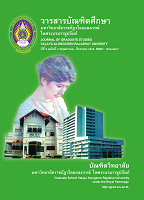ผลการเรียนรู้ในรายวิชามนุษย์กับการดำเนินชีวิตและการพัฒนาจริยธรรมสิ่งแวดล้อมของนักศึกษาสาขาการบริการในอุตสาหกรรมการบิน มหาวิทยาลัยราชภัฏวไลยอลงกรณ์ในพระบรมราชูปถัมภ์
Main Article Content
Abstract
การวิจัยครั้งนี้มีวัตถุประสงค์เพื่อ 1) ศึกษาผลการเรียนรู้ในรายวิชามนุษย์กับการดำเนินชีวิตของนักศึกษาสาขาการบริการในอุตสาหกรรมการบิน หลักสูตรศิลปศาสตรบัณฑิต มหาวิทยาลัยราชภัฎวไลยอลงกรณ์ ในพระบรมราชูปถัมภ์ 2) เปรียบเทียบผลการเรียนรู้ในรายวิชามนุษย์กับการดำเนินชีวิตกับเพศของนักศึกษา 3) ศึกษาผลการพัฒนาจริยธรรมสิ่งแวดล้อมของนักศึกษาสาขาการบริการในอุตสาหกรรมการบิน หลักสูตรศิลปศาสตรบัณฑิต มหาวิทยาลัยราชภัฎวไลยอลงกรณ์ ในพระบรมราชูปถัมภ์ และ 4) เปรียบเทียบผลการพัฒนาจริยธรรมสิ่งแวดล้อมกับเพศของนักศึกษา กลุ่มตัวอย่างที่ใช้ในการวิจัยครั้งนี้ คือ นักศึกษาสาขาการบริการในอุตสาหกรรมการบิน หลักสูตรศิลปศาสตรบัณฑิต ที่ลงทะเบียนเรียนในรายวิชามนุษย์กับการดำเนินชีวิต ภาคเรียนที่ 2 ปีการศึกษา 2555 จำนวน 40 คน ได้มาโดยการเลือกแบบเจาะจง (Purposive Sampling) ใช้แผนการทดลอง แบบ One group Pretest-Posttest Design เครื่องมือที่ใช้ในการเก็บรวบรวมข้อมูล คือ แบบทดสอบวัดผลสัมฤทธิ์ทางการเรียนรายวิชามนุษย์กับการดำเนินชีวิต และแบบทดสอบวัดจริยธรรมสิ่งแวดล้อม สถิติที่ใช้ในการวิเคราะห์ข้อมูล คือ ค่าเฉลี่ย ค่าส่วนเบี่ยงเบนมาตราฐาน และค่า t-test Dependent
ผลการวิจัยพบว่า
1. นักศึกษาสาขาการบริการในอุตสาหกรรมการบิน หลักสูตรศิลปศาสตรบัณฑิต มีคะแนนรายวิชามนุษย์กับการดำเนินชีวิต เฉลี่ยก่อนเรียน และคะแนนเฉลี่ยหลังเรียน เมื่อทำการเปรียบเทียบคะแนนเฉลี่ยก่อนเรียนกับคะแนนเฉลี่ยหลังเรียน พบว่า ผลการเรียนรู้ในรายวิชามนุษย์กับการดำเนินชีวิตของนักศึกษาสาขาการบริการในอุตสาหกรรมการบิน หลักสูตรศิลปศาสตรบัณฑิต หลังเรียนสูงกว่าก่อนเรียน อย่างมีนัยสำคัญทางสถิติที่ระดับ .01
2. นักศึกษาชายกับนักศึกษาหญิงมีผลการเรียนรู้ในรายวิชามนุษย์กับการดำเนินชีวิตแตกต่างกัน อย่างไม่มีนัยสำคัญทางสถิติ
3. นักศึกษาสาขาการบริการในอุตสาหกรรมการบิน หลักสูตรศิลปศาสตรบัณฑิต มีคะแนนจริยธรรมสิ่งแวดล้อม เฉลี่ยก่อนเรียน และคะแนนเฉลี่ยหลังเรียน เมื่อทำการเปรียบเทียบคะแนนเฉลี่ยก่อนเรียนกับคะแนนเฉลี่ยหลังเรียน พบว่า ผลการพัฒนาจริยธรรมสิ่งแวดล้อมของนักศึกษาสาขาการบริการในอุตสาหกรรมการบิน หลักสูตรศิลปศาสตรบัณฑิต หลังเรียนสูงกว่าก่อนเรียน อย่างมีนัยสำคัญทางสถิติที่ระดับ .01
4. นักศึกษาชายกับนักศึกษาหญิงมีผลการพัฒนาจริยธรรมสิ่งแวดล้อม แตกต่างกัน อย่างไม่มีนัยสำคัญทางสถิติ
The objectives of this research were to 1) study the learning achievements in man and living hood subject of student in hospitality and service in airline Industry of Valaya Alongkorn Rajabhat University under the Royal Patronage. 2) compare the learning achievements in man and living hood subject with gender of students. 3) study the environmental ethics development of students in hospitality and service in airline Industry of Valaya Alongkorn Rajabhat University under the Royal Patronage and 4) Compare environmental ethics development with gender of students. The samples were 40 students in hospitality and service in airline Industry of man and living hood subject in second semester of 2012 academic year which is from Purposive Sampling. The research methodology was one group pretest-posttest design. The instruments used to collect data were the learning achievement test and environmental ethics test. The data were statistically analyzed by mean, standard deviation and t-test dependent.
The findings of the study were as follows:
1. The students in hospitality and service in airline Industry had learning achievements in man and living hood subject pre-test score and post-test score. post-test score on learning achievements was higher than that of the pre-test score, statistical significance at the level 0.1
2. Male students and female students had learning achievement in man and living hood. There had no statistical significance different.
3. The students in hospitality and service in airline Industry had the environmental ethics development pre-test score and post-test score. post-test score on environmental ethics development was higher than that of the pre-test score, statistical significance at the level 0.1
4. Male students and female students had the environmental ethics development, which had no statistical significance different.
Article Details

This work is licensed under a Creative Commons Attribution-NonCommercial-NoDerivatives 4.0 International License.
บทความทุกเรื่องได้รับการตรวจความถูกต้องทางวิชาการโดยผู้ทรงคุณวุฒิ ทรรศนะและข้อคิดเห็นในบทความ Journal of Global of Perspectives in Humanities and Social Sciences (J-GPHSS) มิใช่เป็นทรรศนะและความคิดของผู้จัดทำจึงมิใช่ความรับผิดชอบของบัณฑิตวิทยาลัย มหาวิทยาลัยราชภัฏวไลยอลงกรณ์ ในพระบรมราชูปถัมภ์ กองบรรณาธิการไม่สงวนสิทธิ์การคัดลอก แต่ให้อ้างอิงแหล่งที่มา


